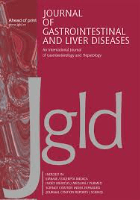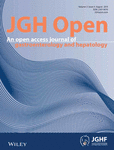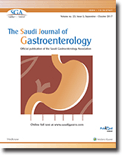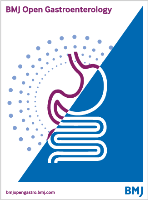
GUT
Scope & Guideline
Exploring Innovations in Gastrointestinal Research
Introduction
Aims and Scopes
- Gut Microbiome Research:
The journal emphasizes the role of the gut microbiome in health and disease, exploring its impact on conditions like inflammatory bowel disease, metabolic disorders, and gastrointestinal cancers. - Innovative Therapeutic Approaches:
Research published in "GUT" often discusses novel therapeutic strategies, including biologics, immunotherapy, and personalized medicine, aimed at improving patient outcomes in gastrointestinal disorders. - Clinical Guidelines and Practice:
The journal regularly features articles that contribute to the development and evaluation of clinical guidelines for managing various gastrointestinal conditions, ensuring that practice is evidence-based. - Epidemiological Studies:
"GUT" publishes studies that investigate the epidemiology of gastrointestinal diseases, helping to identify risk factors and trends in patient populations. - Technological Advances in Diagnosis:
The journal highlights advancements in diagnostic technologies, including endoscopic techniques and imaging modalities, that enhance the detection and management of gastrointestinal diseases. - Environmental and Lifestyle Factors:
Research exploring the influence of environmental and lifestyle factors on gastrointestinal health, such as dietary impacts on microbiota composition and disease progression, is a significant focus. - Cancer Research:
The journal covers research related to gastrointestinal cancers, including colorectal cancer, highlighting genetic, molecular, and environmental factors that contribute to cancer development and treatment outcomes.
Trending and Emerging
- Artificial Intelligence in Gastroenterology:
The use of AI for enhancing diagnostic accuracy, particularly in endoscopy and polyp detection, is increasingly prevalent, signaling a shift towards integrating technology in clinical practice. - Gut-Brain Axis Research:
Research exploring the interactions between the gut microbiome and neurological conditions, such as the implications of gut health on mental health and neurodegenerative diseases, is gaining prominence. - Metabolic Dysfunction-Associated Liver Disease (MAFLD):
The focus on MAFLD is rising, reflecting a growing recognition of its public health implications and the need for effective management strategies in the context of obesity and diabetes. - Personalized Medicine Approaches:
There's an increasing emphasis on personalized medicine in managing inflammatory bowel disease and other gastrointestinal disorders, with research aimed at tailoring treatments based on individual patient profiles. - Environmental Impact of Gastroenterology Practices:
Emerging research on the environmental footprint of gastrointestinal practices, including sustainable endoscopy, reflects a growing awareness of the need for environmentally responsible healthcare. - Microbiome Therapeutics:
The exploration of microbiome-based therapies, including fecal microbiota transplantation and targeted probiotics, is trending as a novel approach to treating various gastrointestinal conditions. - Immunotherapy for GI Cancers:
The application of immunotherapeutic strategies for treating gastrointestinal cancers, particularly hepatocellular carcinoma and colorectal cancer, is an area of active research and clinical interest.
Declining or Waning
- Traditional Pharmacological Interventions:
As the field shifts towards personalized medicine and biologic therapies, traditional pharmacological treatments for gastrointestinal diseases, such as older anti-inflammatory drugs, are being discussed less frequently. - Basic Science Studies:
There has been a noticeable decline in purely basic science studies that do not directly translate to clinical practice, as the journal increasingly favors translational research that addresses clinical questions. - Surgical Techniques for Common GI Disorders:
Research focusing on traditional surgical techniques for common gastrointestinal disorders appears to be declining, possibly due to the increasing emphasis on minimally invasive and endoscopic approaches. - Single-Center Studies:
The journal is moving towards more multicenter and collaborative studies, which provide broader insights and generalizability, while single-center studies are becoming less common. - Conventional Endoscopy Techniques:
The frequency of articles solely addressing conventional endoscopy techniques may be waning as newer technologies and AI-assisted methods gain traction in the field.
Similar Journals

Canadian Journal of Gastroenterology and Hepatology
Pioneering Research for a Healthier Digestive SystemCanadian Journal of Gastroenterology and Hepatology, published by HINDAWI LTD, serves as a vital resource in the fields of gastroenterology and hepatology. Since its inception in 1987, this open-access journal has made significant contributions to advancing research and clinical practice through its comprehensive coverage of topics ranging from liver diseases to gastrointestinal disorders. With an impressive Q2 ranking in Gastroenterology and a Q3 ranking in Hepatology as of 2023, the journal has established itself as an influential platform for researchers and healthcare professionals seeking to disseminate and acquire knowledge. The journal is based in Egypt, with its operational headquarters located in London, England. Notably, it holds a respectable standing in Scopus rankings, placed at Rank #64 in Gastroenterology and Rank #34 in Hepatology, reflecting its impact and relevance in the medical community. With a commitment to quality and accessibility, the Canadian Journal of Gastroenterology and Hepatology continues to foster innovation and collaboration among its readers.

Journal of Gastrointestinal and Liver Diseases
Pioneering Insights for a Healthier Digestive SystemThe Journal of Gastrointestinal and Liver Diseases, published by MEDICAL UNIV PRESS in Romania, serves as a pivotal platform for the dissemination of significant research in the fields of gastroenterology and hepatology. Established in 2006, this journal has evolved over the years, currently holding a Q3 rank in Gastroenterology and a Q2 rank in Medicine (miscellaneous), reflecting its commitment to high-quality scholarship and impactful contributions to medical science.
With an ISSN of 1841-8724 and an E-ISSN of 1842-1121, the journal engages a diverse readership of researchers, clinicians, and students passionate about advancing knowledge in gastrointestinal and liver health. While it currently does not operate under an open access model, the journal remains a vital resource for those seeking to stay updated on the latest developments and emerging trends in the field. As it converges towards a broader impact, projected through its coverage until 2024, the Journal of Gastrointestinal and Liver Diseases continues to contribute to the academic landscape, encouraging innovation and comprehensive understanding in digestive health.

DIGESTIVE DISEASES
Pioneering Research in Digestive Health.DIGESTIVE DISEASES, published by KARGER, stands as a leading international journal dedicated to the field of gastroenterology and digestive health. With an ISSN of 0257-2753 and E-ISSN 1421-9875, the journal has been providing a platform for high-quality research since its inception in 1983, continuing to disseminate groundbreaking findings and insights through to 2024. Positioned in the second quartile (Q2) of both the gastroenterology and miscellaneous medicine categories as of 2023, DIGESTIVE DISEASES is recognized for its rigorous peer-review process and its contributions to advancing clinical and experimental gastroenterological knowledge. Its Scopus ranking at #62 out of 167 in the gastroenterology field reflects its significant impact, as it reaches a notable 63rd percentile among its peers. While it does not currently offer open access options, its subscription model ensures that vital research is available to professionals and institutions committed to the field. The journal serves as an essential resource for researchers, clinicians, and students alike who seek to deepen their understanding of digestive disorders and their implications in medicine.

Minerva Gastroenterology
Driving Progress in Gastroenterology and BeyondMinerva Gastroenterology, published by EDIZIONI MINERVA MEDICA, is a notable academic journal dedicated to advancing the field of gastroenterology and related disciplines. With an ISSN of 2724-5985 and an E-ISSN of 2724-5365, this journal gathers innovative research from diverse areas including internal medicine, endocrinology, and metabolism. Though characterized by its open-access policies, Minerva Gastroenterology aims to provide a platform for high-quality scholarly articles with an emphasis on critical reviews, clinical studies, and translational research. Since its inception in 2021, the journal has managed to secure a reputation reflected in its Q3 rank across multiple categories in 2023, as well as its standing in Scopus rankings, positioning it in the 45th to 47th percentile among renowned medical journals. Situated in Turin, Italy, it fosters collaboration and knowledge-sharing among researchers and practitioners, making it an essential resource for those seeking to deepen their understanding of gastroenterological conditions and enhance clinical practices.

JGH Open
Advancing Gastroenterology and Hepatology Knowledge for AllJGH Open is a prominent open-access journal dedicated to advancing knowledge in the fields of Gastroenterology and Hepatology, published by WILEY. Since its inception in 2017, the journal has served as a crucial platform for researchers, professionals, and students to disseminate innovative research findings and clinical insights. With an impact factor and Scopus rankings reflecting its steady growth—ranking in the 3rd quartile for both Gastroenterology (Q3) and Hepatology (Q3)—JGH Open is positioned within the competitive landscape of medicine. Its commitment to open access enhances the visibility and accessibility of high-quality research, ensuring that significant advancements in understanding diseases of the gastrointestinal tract and liver reach a broad audience. With a focus on collaboration and dissemination of knowledge, JGH Open aims to contribute to the global discourse and improve outcomes in gastrointestinal health.

Saudi Journal of Gastroenterology
Connecting researchers to the latest in gastroenterology.The Saudi Journal of Gastroenterology is a premier platform dedicated to advancing research and clinical practice in the field of gastroenterology. Published by Wolters Kluwer Medknow Publications, this open-access journal has been serving the academic community since 1995 from its base in India. With an ISSN of 1319-3767 and an E-ISSN of 1998-4049, the journal allows unrestricted access to a wealth of knowledge, fostering an environment where researchers, professionals, and students can engage with cutting-edge studies. As of 2023, it is categorized in the Q3 quartile within gastroenterology, ranking #74 out of 167 in Scopus, which places it within the 55th percentile of its field. The journal aims to disseminate significant findings, clinical trials, and innovative theories that shape the understanding of gastrointestinal disorders and practices. With a commitment to quality and relevance, the Saudi Journal of Gastroenterology is pivotal for anyone seeking to enhance their knowledge and expertise in this vital area of medicine.

GASTROENTEROLOGY CLINICS OF NORTH AMERICA
Elevating Clinical Practice in GastroenterologyGASTROENTEROLOGY CLINICS OF NORTH AMERICA, published by W B SAUNDERS CO-ELSEVIER INC, stands as a leading journal in the field of gastroenterology, boasting a prestigious Q1 classification in its category for 2023. With an impressive Scopus ranking of 33 out of 167 and occupying the 80th percentile, it serves as a vital resource for researchers, professionals, and students dedicated to advancing knowledge and practice in gastroenterology. This journal, with ISSN 0889-8553 and E-ISSN 1558-1942, has been disseminating cutting-edge research and clinical insights since its inception in 1987, with ongoing relevance into 2024. Although not an open-access journal, it ensures accessibility through institutional subscriptions, providing a platform for high-impact articles that address contemporary challenges and innovations in gastroenterology. The journal’s steadfast commitment to promoting evidence-based medicine makes it an invaluable resource for those aiming to enhance patient care and expand the frontiers of gastrointestinal health.

Gastroenterology
Unveiling the Latest in Digestive Health ResearchGastroenterology, published by W B Saunders Co-Elsevier Inc, is a premier journal dedicated to advancing the knowledge and practice within the fields of gastroenterology and hepatology. Established in 1945 and covering a wide range of topics related to digestive health, this journal holds a distinguished position in the academic community, as evidenced by its impressive Q1 status in both Gastroenterology and Hepatology categories, and its high rankings (4th in both disciplines) in Scopus, placing it in the top percentile for scholarly impact. With its commitment to publishing high-quality research, reviews, and clinical studies, Gastroenterology provides an essential resource for researchers, healthcare professionals, and students seeking cutting-edge insights that inform clinical practices and enhance patient care. Although it does not currently offer open access, the journal continues to serve as a vital platform for disseminating meaningful research that shapes the future of digestive disease management.

BMJ Open Gastroenterology
Connecting Researchers for a Healthier Gastrointestinal FutureBMJ Open Gastroenterology is a premier open access journal published by the esteemed BMJ Publishing Group, focusing on the dynamic and evolving field of gastroenterology. Established in 2014, the journal has rapidly ascended in stature, reflected in its impressive 2023 Q1 ranking in gastroenterology and its position within the top 25% of journals in the category according to Scopus. With a mission to disseminate high-quality, peer-reviewed research with global significance, the journal provides a vital platform for researchers, professionals, and students alike to share their findings and advancements in gastrointestinal medicine. Operating from its headquarters in London, England, the journal's open access format ensures wide visibility and accessibility of cutting-edge research, making it an invaluable resource for those dedicated to improving patient care and driving innovation in gastroenterological sciences. By engaging with this journal, contributors and readers can stay at the forefront of critical developments in the field, fostering a collaborative environment for knowledge exchange.

Pediatric Gastroenterology Hepatology & Nutrition
Illuminating the path to better nutrition and gastrointestinal health.Pediatric Gastroenterology Hepatology & Nutrition is a pivotal academic journal published by the Korean Society of Pediatric Gastroenterology & Nutrition, focusing on the critical fields of pediatric gastroenterology, hepatology, and nutrition. Located in South Korea, this journal aims to disseminate high-quality research, review articles, and clinical studies to advance knowledge and practice in the care of children with gastrointestinal and nutritional disorders. With a Converged Years span from 2012 to 2024 and categorized in the Q2 and Q3 quartiles in 2023 across multiple related fields, the journal holds a significant position within the academic community, reflecting its impactful contribution to the discipline. Although currently not open access, the journal ensures that content is accessible to a broad audience through various institutional subscriptions. The journal appeals to researchers, healthcare professionals, and students alike, providing an essential platform for the exchange of innovative ideas and research findings aimed at improving pediatric patient care.